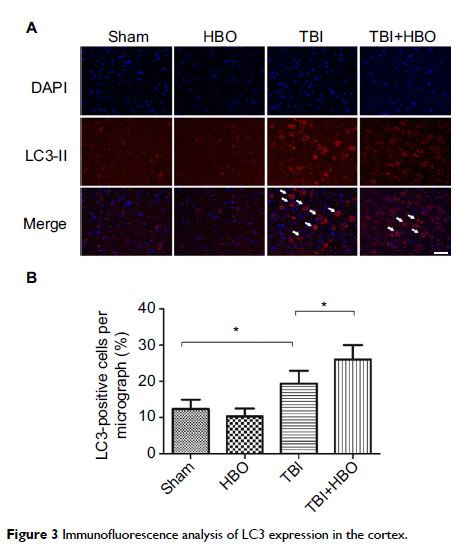109568
论文已发表
注册即可获取德孚的最新动态
IF 收录期刊
- 3.4 Breast Cancer (Dove Med Press)
- 3.2 Clin Epidemiol
- 2.6 Cancer Manag Res
- 2.9 Infect Drug Resist
- 3.7 Clin Interv Aging
- 5.1 Drug Des Dev Ther
- 3.1 Int J Chronic Obstr
- 6.6 Int J Nanomed
- 2.6 Int J Women's Health
- 2.9 Neuropsych Dis Treat
- 2.8 OncoTargets Ther
- 2.0 Patient Prefer Adher
- 2.2 Ther Clin Risk Manag
- 2.5 J Pain Res
- 3.0 Diabet Metab Synd Ob
- 3.2 Psychol Res Behav Ma
- 3.4 Nat Sci Sleep
- 1.8 Pharmgenomics Pers Med
- 2.0 Risk Manag Healthc Policy
- 4.1 J Inflamm Res
- 2.0 Int J Gen Med
- 3.4 J Hepatocell Carcinoma
- 3.0 J Asthma Allergy
- 2.2 Clin Cosmet Investig Dermatol
- 2.4 J Multidiscip Healthc

高压氧治疗用于与自噬性途径有关的创伤性脑损伤时的神经保护
Authors Liu WC, Wen L, Wang H, Gong JB, Zhan TX, Meng YY, Yang XF
Received 5 August 2016
Accepted for publication 10 January 2017
Published 7 April 2017 Volume 2017:5 Pages 85—91
DOI https://doi.org/10.2147/JN.S119037
Checked for plagiarism Yes
Review by Single-blind
Peer reviewers approved by Dr Colin Mak
Peer reviewer comments 4
Editor who approved publication: Prof. Dr. Hongyun Huang
Abstract: In the present study, we evaluated the changes in autophagy after
hyperbaric oxygen (HBO) treatment for traumatic brain injury (TBI) and
investigated whether autophagy takes part in the neuroprotection after HBO
treatment. Male Sprague Dawley rats were assigned to four groups randomly: sham
injury, sham injury and HBO, TBI, and TBI and HBO. The HBO rats received HBO
treatment for 100 min immediately after injury. Rats were sacrificed at 24 h
after the brain injury and the levels of cleaved caspase-3 and the number of
terminal deoxynucleotidyl transferase-mediated dUTP nick end labeling-positive
cells in the injured cortex were measured to determine cell death. The
expression levels of autophagy-associated proteins were measured by
immunohistochemistry and Western blotting to assess changes in autophagy. Terminal
deoxynucleotidyl transferase-mediated dUTP nick end labeling-positive cell
density and cleaved caspase-3 expression were increased 24 h after TBI. These
increases were suppressed by post-TBI HBO treatment. Immunohistochemistry and
Western blotting of autophagy-associated proteins showed that TBI can induce
autophagy and that HBO treatment can further upregulate the expression of
autophagy makers, as shown by an increase in LC3, ATG-5, and Beclin-1
expression and reduction in P62 expression. In conclusion, HBO treatment can
reduce apoptosis and further upregulate autophagy in the injured cortex after
brain injury, and the autophagy pathway may take part in the neuroprotection
provided by HBO treatment for TBI.
Keywords: autophagy, hyperbaric oxygen treatment,
traumatic brain injury, apoptosis, neuroprotective effect
